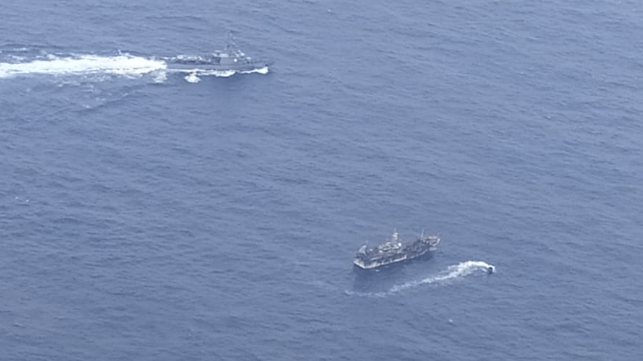Report: The Corporate Owners Behind Illegal Fishing

With illegal, unreported and unregulated (IUU) fishing gaining prominence as an ocean emergency of our times, there is very little information about the real owners of the foreign distant vessels used in the pillage of the fisheries resources. The owners of the IUU vessels are shrouded in a shady web of financial secrecy and complex corporate structures surrounding the vessels.
Authorities in many nations do not collect information on the beneficial owners of fishing vessels. In most instances, licensing and registration only requires information on the legal owner, which is often a holding company.
Last week, the Financial Transparency Coalition (FTC) released a report on the expanding IUU fleet. Specifically, the report tries to shed light on those responsible for IUU fishing, carrying out the largest analysis of IUU fishing ownership data to date.
To achieve this, the report identified nearly one thousand industrial and semi-industrial fishing vessels reported to be operating illegally from 2010 until May 2022. This is four times more than the IUU unified list from regional fisheries management organizations for that same period.
FTC’s team found that individual shareholders only constitute 16.7 percent of vessels reported to be involved in IUU fishing, revealing the ultimate beneficial information gap in the sector. Further, the report was only able to identify companies behind 43.3 percent of the detected IUU vessels, which are often shell companies or shady joint ventures.
Developing countries lose billions of dollars in illicit financial flows due to IUU fishing. Africa alone, where half of all IUU vessels operated, loses $11.5 billion every year from this practice. The most affected sub-region is West Africa, where 40 percent of the global IUU fishing took place with a loss of up to $9.4 billion in illicit financial flows.
10 companies identified by FTC allegedly own 23.7 percent of all vessels involved in IUU fishing for which the beneficial owners were identified, with some linked to tax havens. Eight of these companies are from China, led by China’s Pingtan Marine Enterprise, incorporated in the Cayman Islands and listed on the NASDAQ exchange.
The China National Overseas Fisheries Corporation follows it, which is state-owned. In the top 10 list, there is also a company from Columbia and another from Spain.
“Spanish tuna giant Albacora SA emerges as Europe’s largest IUU fishing company and has received millions in dollars in EU and other subsidies despite its vessels being fined millions in dollars for IUU fishing,” alleges the FTC report.
However, in a response to The Guardian newspaper, Albacora SA denied any involvement in IUU fishing. “IUU fishing is a very grave matter, which this company takes very seriously. We deny any accusations related to this,” a spokesman of the company said.
Neither Pingstan Marine Ltd nor China National Overseas Fisheries Corporation responded to FTC’s request for comment.
Instructively, one-third of detected IUU vessels were flagged to China, followed by Ghana, South Korea, Italy, Taiwan and Indonesia.
The use of Ghanaian flags is particularly concerning, given its widely reported use as a cover (by mainly Chinese vessels) to continue operating in this West African country and avoid fisheries controls through opaque joint ventures.
But what recourse is available for IUU fishing?
The High-Level Panel for the Sustainable Ocean Economy (The Ocean Panel) identifies ownership and financial secrecy as a key driver for IUU fishing.
“Ownership transparency is part of the solution towards ending IUU fishing, especially in Africa, which is one of the most affected regions by this illicit trade,” recommends The Ocean Panel.

that matters most
Get the latest maritime news delivered to your inbox daily.
Unfortunately, financial transparency in the fishing sector is a hard nut to crack. The Financial Action Task Force (FATF) - an intergovernmental body tasked to combat money laundering - does not regard fisheries as an extractive industry. Thus, no serious steps can be taken to put an end to the financial secrecy, ultimately shielding those involved in IUU fishing.
In addition, the FTC report urges the EU, the US and Japan - which together account for 55 percent of the seafood market - to intensify their commitment to tackle IUU fishing through supply chain transparency and conducting due diligence.
